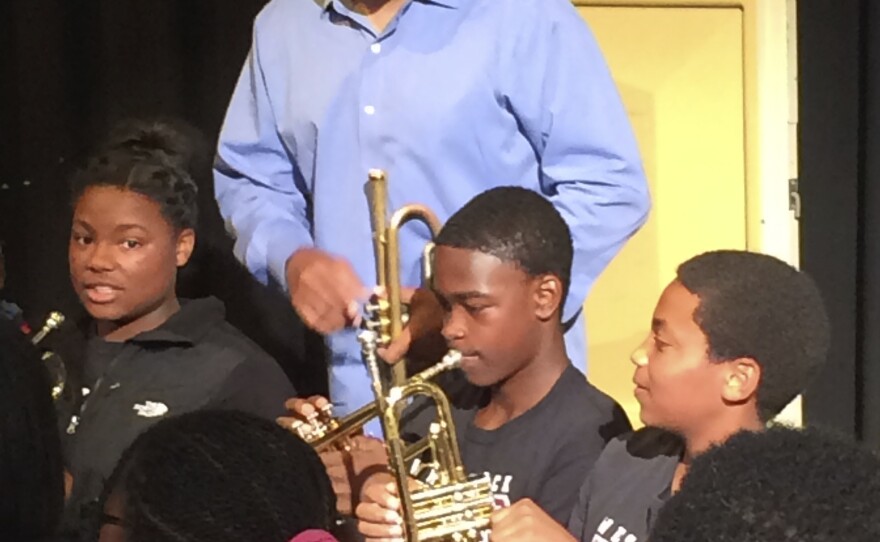Jazz legend Wynton Marsalis was in town this week, but not just as a performer.
He was also a teacher.
It’s late Tuesday morning in the auditorium at West Mecklenburg High School, and band instructor William McLeod is preparing to guide his charges through a popular marching tune titled “Spotlight Groove.”
He wants his students to mind their enunciation, diction, and intonation. And on the stage is a man who first cradled a trumpet as a 6-year-old boy in his hometown of New Orleans. Now, as artistic director of the Jazz at Lincoln Center Orchestra, he’s America’s leading ambassador of jazz.
Wynton Marsalis turns his attention to the tuba and bass drum players.
“I want to talk about the rhythm in the beginning. I want to get together with my tuba and my bass drum, OK? We have a little problem in the rhythm …”
Marsalis says he likes their spirit, but they’re not tight enough.
“As it went on, it was good, but I just want to hear the drums and the tuba in the beginning,” he explains.
Marsalis, who turns 53 this month, pays frequent visits to public schools as part of Jazz at Lincoln Center’s educational outreach efforts. He also does it in tribute to his own music teachers back in New Orleans, including his father, Ellis, who in his 70s is still an active pianist.
“It’s invigorating to see the work that their parents do, and to see the work that the band instructors do. The kids are always eager to learn, and they always are respectful,” he says.
Marsalis and 12 other members of his orchestra fanned out to schools throughout CMS on Tuesday. He says he values the time he gets to spend with young people who often have limited opportunities to play any kind of music. Arts and music programs are often seen as expendable when it comes to budget cuts.
“It’s a never-ending struggle, not just for me but for all the people who work in the arts, to raise the consciousness of the nation.”
Marsalis started by covering some basics.
“Everything I say, I’m serious about too, now. I’ll be playing, but I’m only about music. That’s what I believe in. We’re gonna work on whatever we work on, and we’re gonna get right to it, and I want y’all to be with me, all right? OK.”
He moved on to his own warm-up.

Marsalis then explained some of his own outlooks on the foundations of music and learning.
“Practicing is about repetition until it’s right. But it’s not just dumb repetition. It’s intelligent repetition. Each time you repeat something, you try to get it a little better.”

He instructed band members on the importance of breathing correctly, listening to their bandmates, and precision in their coordination with others.
“We talked about lining our rhythms up, right? That means we know what our rhythms are. You know when y’all play a rhythm together, make up your mind how you’re gonna play it.”
He explained that greatness is a choice. A good teacher can make someone competent, but that person has to want to be great.
“The vibration y’all are on in general, I love that. I wish I could be here more to be around y’all,” said Marsalis.
Afterward, sophomore trumpet player Gary Carter said he was happy Marsalis—whom he’d heard of but wasn’t familiar with—had come to visit.
“Mr. Marsalis, he taught me a lot today. He taught me how to improve my skills, the technique of breathing, stuff like that,” said Carter.
Of course, these kids are more familiar with hip-hop than jazz, like senior snare drummer and student body president Jalil Pack. Still, he called the session with Marsalis “amazing.”
“Just the way that he helped the drum line and basically the bass and the tuba, how they incorporate that one beat of the song we played—to bring it all together and to get the measurement straight and get everything in place—it makes it a little bit better,” said Pack.
Until the 1950s, jazz dominated American popular music. Today, it’s regarded as a relic in some circles. It hardly mattered Tuesday. After the lessons were done, the man with the trumpet joined the West Meck band for a little New Orleans-style second line jam—one more time, with feeling.
This story was produced as part of the Charlotte Arts Journalism Alliance, with support from the Wells Fargo Foundation.



